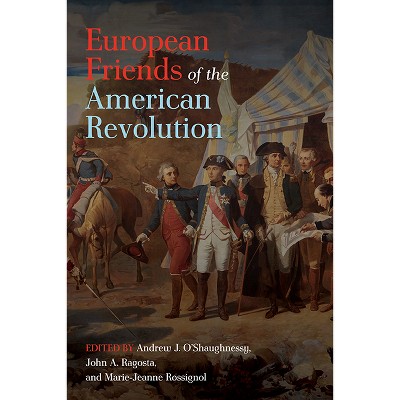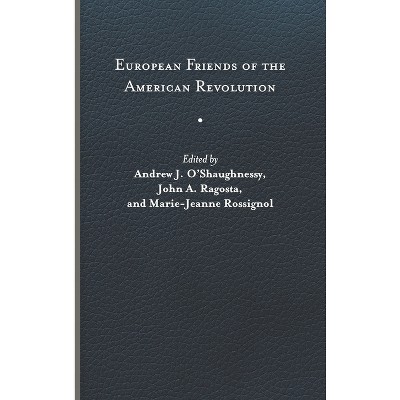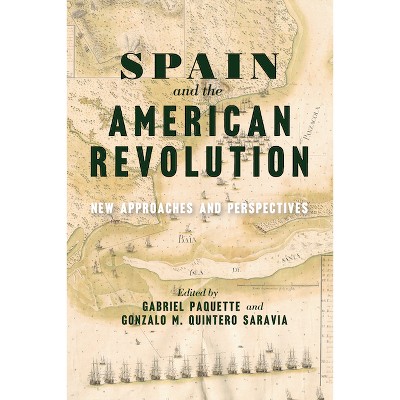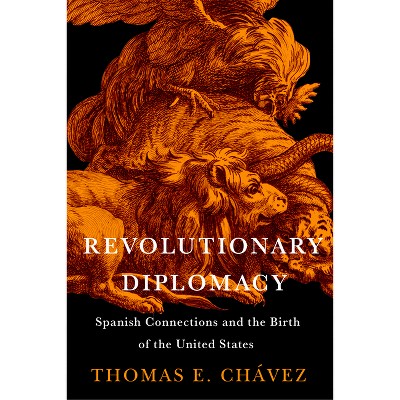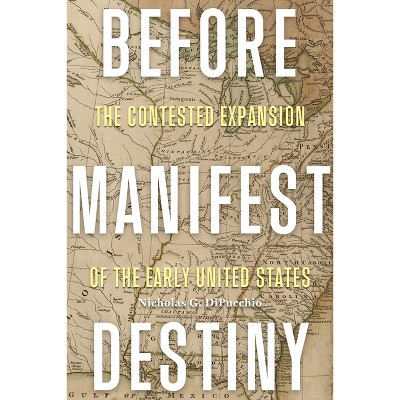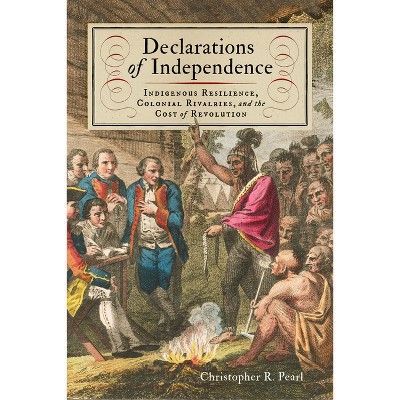The American Revolution and the Habsburg Monarchy - (The Revolutionary Age) by Jonathan Singerton

About this item
Highlights
- In 1783, the Peace of Paris treaties famously concluded the American Revolution.
- About the Author: Jonathan Singerton is Assistant Professor in Global Political History at the Vrije Universiteit Amsterdam
- 390 Pages
- History, United States
- Series Name: The Revolutionary Age
Description
About the Book
"This book presents the American Revolution from the perspective of the Habsburg monarchy. It reveals how, despite seeming antithetical to the American cause, the Habsburg dynasty and people in the Habsburg lands realized the opportunity unleashed by the creation of the thirteen United States of America, demonstrating the wider effects of the American Revolution beyond the standard Atlantic World and portraying the Habsburg Monarchy in a new, oceanic light"--Book Synopsis
In 1783, the Peace of Paris treaties famously concluded the American Revolution. However, the Revolution could have come to an end two years earlier had diplomats from the Habsburg realms--the largest continental European power--succeeded in their attempts to convene a Congress of Vienna in 1781. Bringing together materials from nearly fifty American, Austrian, Belgian, British, Czech, Dutch, French, German, Hungarian, Italian, Slovak, and Swedish archives, Jonathan Singerton reconstructs the full sweep of relations between the nascent United States and one of the oldest European dynasties during and after the American Revolution.
The first account to analyze the impact of the American Revolution in the Habsburg lands in full, this book highlights how the American call to liberty was answered across the farthest reaches of central and eastern Europe. Although the United States failed to sway one of the largest, most powerful states in Europe to its side in the War for American Independence, for several years, the Habsburg ruling and mercantile elites saw opportunity, especially for commerce, in the news of the American Revolution. In the end, only Thomas Jefferson's disdain for Holy Roman Emperor Joseph II and avoidance of Habsburg diplomatic representatives in Paris prevented Vienna's formal recognition of the United States, resulting in a half century of uneven Habsburg-American relations.
By delineating the earliest social and economic exchanges between the Habsburg monarchy and the United States after 1776, Singerton offers a broad reexamination of the American Revolution and its international reverberations and presents the Habsburg monarchy as a globally oriented power in the late eighteenth century.
Review Quotes
A fresh and exciting read!--Eduard Habsburg, Hungarian Ambassador to the Holy See
Singerton's impressively well-researched book . . . makes an important contribution to the history of Europe as well as North America. . . . Given the thoroughness with which Singerton explores the perspectives of different actors--ministers, diplomats, merchants, and the general public--it is almost unthinkable that a fuller account could be given.--Stephen Conway, Journal of American History
Singerton's monograph is a true triumph that Americanists, Europeanists, and scholars of the Atlantic world should read and celebrate.--Eric Grube, Journal of Austrian Studies
A pathbreaking study making a major contribution to both American and European history. Particularly valuable is Singerton's treatment of Thomas Jefferson's responsibility for the failure of American-Austrian trade relations.
--Jonathan R. Dull, Yale University, author of A Diplomatic History of the American RevolutionIt is cleverly researched, well written and a great read on an interesting topic. A must read for all those interested in the Habsburg Monarchy, the American Revolution, and eighteenth-century Enlightenment
--Michael-W. Serruys, Vrije Universiteit BrusselJonathan Singerton has meticulously scoured a range of archives and secondary sources in multiple languages to piece together a story of US-Habsburg relations in an era before the governments' official exchange of diplomats and a more robust US State Department began to create a centralized institutional archive. The author emphasizes the importance of specific, well-placed individuals, from prominent figures like Benjamin Franklin and Thomas Jefferson to merchants based in the Austrian Netherlands and Trieste.
--Nicole M. Phelps, University of Vermont, author of U.S.-Habsburg Relations from 1815 to the Paris Peace Conference: Sovereignty TransformedThe Habsburg dimension of the American Revolution is a conspicuous gap in the scholarly literature. This alone is reason to welcome Jonathan Singerton's book. Accessibly written and extremely well researched, it tells a fascinating story, from a Viennese family who named their young son Benjamin Silas Arthur for the three American representatives in Paris, to Habsburg encounters with Native Americans in New York, to American smugglers and pirates in Europe. Singerton does a superb job of capturing the breadth of Habsburg engagement with the Revolution as a cultural phenomenon, as a diplomatic problem, and as a commercial opportunity.
--Eliga Gould, University of New Hampshire, author of Among the Powers of the Earth: The American Revolution and the Making of a New World EmpireThe Habsburg Monarchy was one of the European great powers in the period of the American Revolution. Nevertheless, the study of its relationship to the American events is still a relatively neglected field. This is one of the reasons why this book is so important. The other reason is that the author made a very serious and successful effort to cover not only Austria proper, but all of the Habsburg lands, including the Czech and Hungarian lands. Additionally, Singerton not only discusses diplomatic, but also the cultural and commercial aspects of this pertinent and interesting topic.
--Csaba Lévai, University of Debrecen, HungaryPresents a convincing account of the importance of the Habsburgs in central and eastern Europe on the American Revolution. Possibly more significant, this book uses the American Revolution to shine light on, and complicate, the picture of the Age of Revolutions when viewed through Habsburg eyes . . . The American Revolution shaped how Habsburgs viewed the balance of power in Europe, the possibility of wealth from the Americas, and their own sovereignty. For common people, it could indeed prove a rallying cry, as we see in the epilogue with Habsburg revolutionaries in 1848 making connections to the American Revolution.--Elliot Warren (William & Mary), H-War
Singerton repositions the Habsburg monarchy into the middle of the story of the American Revolution. This meticulously researched work pulls on the personal stories, political foibles, trade economics, and cultural detritus of the American Revolution as a global event that involved and affected the largest and arguably most important empire of the time . . . For such a politically and economically oriented topic, The American Revolution and the Habsburg Monarchy focuses on the stories of the people involved and really brings them to life. Readers get to know Baron Beelen, Benjamin Franklin, Jan Ingenhousz, Wenzel Anton von Kauntiz-Rietberg, Joseph II, Sir Robert Murray Keith, William Lee, and Maria Theresa among others as they danced across the international stage . . . Singerton skillfully takes a big topic and contextualizes the story through stories; the result is both informative and highly enjoyable.--Austrian History Yearbook
About the Author
Jonathan Singerton is Assistant Professor in Global Political History at the Vrije Universiteit Amsterdam






